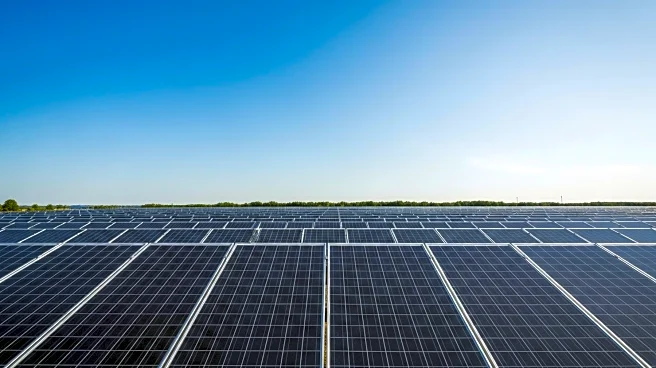What's Happening?
Toyota Kentucky has inaugurated a 30-acre solar field at its Georgetown manufacturing facility, marking a significant step towards achieving its 2030 net-zero emissions target. The solar installation, unveiled on Friday, is designed to generate 15 million kilowatt hours annually, which is sufficient to power approximately 1,400 average U.S. homes. This initiative underscores Toyota's commitment to reducing its dependency on non-renewable energy sources. Ebonye Allen, Environmental Engineering Manager for Toyota North America, highlighted the project's benefits for the plant, community, and broader environmental goals. The solar field will contribute 4% of the plant's total energy needs, a notable impact given the facility's substantial electricity requirements for vehicle production. Scott County Judge Executive Joe Covington emphasized the long-term advantages of this renewable energy investment.
Why It's Important?
The opening of the solar field is a pivotal move in Toyota's broader sustainability strategy, which aims to make all North American facilities carbon neutral by 2035. The 2030 net-zero target serves as an interim milestone in this journey. By reducing reliance on non-renewable energy and lowering its carbon footprint, Toyota is setting a precedent for other companies in the region. Chad Miller, Vice President of Manufacturing at Toyota Kentucky, noted that the project serves as a model for regional businesses, encouraging them to adopt similar sustainable practices. This initiative not only contributes to environmental conservation but also positions Toyota as a leader in corporate responsibility and innovation in the automotive industry.
What's Next?
While specific details about future solar installations were not disclosed, Toyota officials have indicated that the 30-acre site is just one step in the company's ongoing sustainability efforts. Toyota Kentucky is actively participating in the Toyota Environmental Challenge 2050, which aims to achieve positive environmental impacts through recycling systems, minimizing water usage, and reducing CO2 emissions. The success of the Georgetown solar field may inspire further investments in renewable energy across Toyota's facilities, potentially influencing industry standards and encouraging other manufacturers to pursue similar environmental goals.
Beyond the Headlines
The solar field initiative reflects a growing trend among major corporations to integrate sustainability into their operational strategies. This move by Toyota could have broader implications for the automotive industry, potentially influencing regulatory policies and consumer expectations regarding environmental responsibility. As companies increasingly prioritize eco-friendly practices, there may be a shift towards more stringent environmental standards and incentives for sustainable development.









